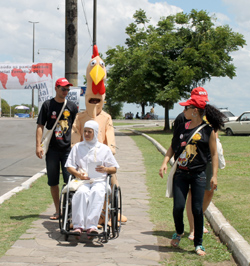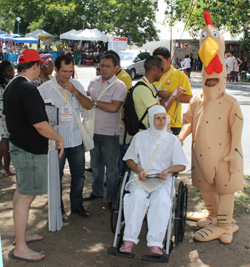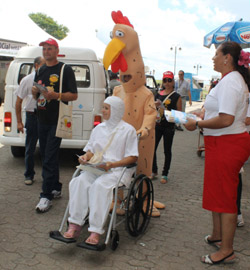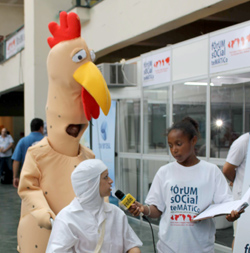|
Sardá is national manager of the Project to Improve Working Conditions in
Meatpacking Plants, a program implemented under the Public Ministry of Labor. He
is also a member of the Permanent Joint Tripartite Commission, where the state,
business and trade unions are discussing the drafting of the Regulating Standard
on Occupational Health and Safety in Slaughterhouses and Meat and Meat Byproduct
Processing Companies (RS). A staunch critic of the lack of ethics in Brazil’s
leading meatpacking companies, he also criticizes government and labor action,
saying it is not enough.
| |
|
| |
 |
| |
Some
workers make as many as 120 movements per minute, and studies show
that more than 30 movements per minute can put a worker’s health at
serious risk of injury. |
| |
 |
| |
The
sector’s poor working conditions operate as a form of social
dumping, through the violation of health regulations and
environmental, and it is all done with the aim of bringing down the
price of the products. |
| |
 |
| |
Brazil is the China of the poultry sector. No other poultry industry
in the world can put out products as cheap as Brazil’s. That is
obviously achieved at a very high social cost |
| |
 |
| |
|
-What is the Public
Ministry of Labor and what are its duties?
-As provided by the
Constitution, the role of the Public Ministry of Labor (MPT) is to
defend the legal system and the democratic rule of law, which includes the
protection of diffuse rights and interests [NB: these are collective rights
enjoyed by a group of indeterminate people linked by a circumstantial
connection]. The MPT has operational and administrative autonomy, which
means it acts as a body independent of the legislative, executive and judicial
branches.
Its main goals include:
- Combating
slave work and degrading working conditions;
- Eradicating
child exploitation and protecting adolescent workers;
- Promoting
a decent work environment; and
- Guaranteeing
freedom of association.
In the field of health
protection and environmental defense, a specific project was recently created
with the aim of enhancing working conditions in meatpacking plants, under the
coordination of public prosecutor Heiler Ivens de Souza Natali and
myself. I was also appointed project manager.
-How would you describe
the working conditions in Brazil’s meatpacking plants?
-Based on five years of
studying this sector’s companies, I would say that working conditions today
are, without a doubt, completely detrimental to the physical and mental health
of workers.
There is a whole legion
of young workers injured as a result of appalling working conditions.
-Is that the case both
in the beef and pork industries and in poultry plants?
-Yes. But in poultry
plants the problem is more severe due to their excessive work pace. Some
workers make as many as 120 movements per minute, and studies show that more
than 30 movements per minute can put workers at serious risk of injury.
-We’re talking about
more than 700,000 workers in the meat processing industry, right?
-Yes. According to
estimates, there are more than 700,000 workers in the sector, and ergonomic
studies conducted in meatpacking plants revealed that at least 20 percent of
workers suffer from an occupational injury or disease.
-And is the percentage
of injuries dropping or does it remain unchanged?
-The situation has
gotten worse, with an increasing number of workers with musculoskeletal
disorders who are discharged and put on social security insurance. For example,
in Chapecó, Santa Catarina - a major meat-producing state - there has been a
50-percent increase in the number of workers on social security insurance due to
musculoskeletal disorders, including tendonitis, bursitis and back problems, and
there is also a very alarming number of mental disorders brought on by a working
environment with numerous risk factors and enormous pressure.
-What happens to these
sick workers?
-Their employers fire
them. When workers get sick they are passed on to the Integrated Health System (SUS)
and put on social security insurance. They are discarded by their employers and
the state has to assume the responsibility of helping them recover.
Also very alarming is
the large number of people who are affected by musculoskeletal disorders and who
are often rejected even by the social security system, which denies their
disability. So there are many workers who earn no salary and receive no
social security benefits from the state.
-What does the MPT do
when it inspects a meatpacking plant and finds harmful working conditions?
-The MPT works
with a team of experts and workplace inspectors, who assess and monitor working
conditions. Once an inspection is completed, the MPT brings what is known
as a public civil action with the aim of improving working conditions.
A recent significant
example of this was a public civil action brought by the Public Ministry,
through prosecutor Jean Carlo Voltolini, against Seara Alimentos SA,
in Forquilhinha, Creciúma. As a result of this action the working conditions
in the company’s meatpacking plant were judged unsuitable and the company was
sentenced to pay 16 million reais (8.7 million US dollars).
Our National Project
is, therefore, tasked with: identifying the largest companies in Brazil,
those with the greatest incidence of work injuries, carrying out an on-site
inspection, and bringing any public civil actions that may be necessary to
properly condition their workplaces and processes.
-The workers are not
benefiting from the great expansion in Brazil’s meatpacking industry…
-No, they’re not.
Workers are not benefiting and neither is the state, because the social cost of
this activity is very steep.
There is no doubt that
the sector’s poor working conditions operate as a form of social dumping,
through the violation of health regulations and environmental laws, and it is
all done with the aim of bringing down the price of products.
Brazil
is the China of the poultry sector No other poultry industry in the world
can put out products as cheap as Brazil’s chickens. That is obviously
achieved at a very high social cost.
-What expectations are
there with the Regulating Standard?
-It’s an industry-wide
standard and we hope that the Ministry of Labor will approve it to protect
workers’ health, which is a duty of the state.
Among other important
issues, this regulating standard covers the work pace, breaks, recovery from
fatigue, and adjustment of factory equipment.
The working conditions
in meatpacking plants today can only be described as industrial feudalism. The
concept of citizenship does not exist in meatpacking plants, there is no room
for rights there, workers must leave their rights at the door of their
workplace. And as they are not recognized as citizens once they step through the
door, workers enter a realm of complete defenselessness and impunity.
-Together with doctor
Roberto Ruiz, we’re denouncing that trade unions are also not allowed in these
factories…
-That’s right. Brazil
needs to look at the situation of labor to determine what the role of trade
unions is.
There are many clauses
that need to be revised, clauses that are signed even after a process of
collective negotiation, as they represent a curtailment of rights in monetary
terms and a detriment to the health of the worker. For example, many
agreements encourage various forms of pressure so that workers will continue
working even if they’re sick, because if their condition requires sick leave,
they lose their benefits.
That’s without
mentioning that there are a number of rights that are not even discussed, or the
issue of the hour bank, for example, which in the meatpacking sector does
enormous harm.
-Is there anything else
you’d like to add?
-I think it’s time for
the state to take firm action, through the Ministry of Labor, the Ministry of
Health and its bodies.
We need to put a stop
to the widespread impunity that allows employers to drive so many of their
workers to ill health and degrade their working environment so badly. Firm
action needs to be taken by everyone: the Public Ministry, the courts, the
state, the labor movement, and the entire population.
We need to change the
way work is organized. We understand that companies need to make a profit,
but it should not be done at the expense of their workers’ health.
That is an ill-gotten
profit, which is not good for workers or for Brazilian society as a whole.
|